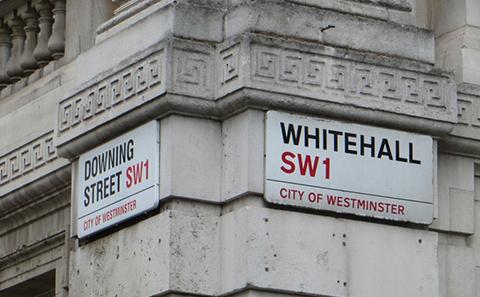
Policy Projects
Learn about PPS led current collaborative projects between the University of Southampton researchers and UK Government and Parliament.

This blog is also hosted by the International Science Council, as part of their Transform21: Global ccience portal, in the run-up to COP26 and COP15. Explore Transform21 here.
The United Nations’ (UN) Intergovernmental Panel on Climate Change (IPCC) recently published a report where it analysed the science of climate change and used improved climate modelling to predict future scenarios based on varying degrees of greenhouse gas (GHG) emission reductions. Worryingly, the report found that the world is likely to temporarily reach 1.5°C of warming by 2040 even in a best-case scenario of deep cuts in GHG emissions. In doing so, it highlighted once more the scale of the challenge and the investment needed to achieve the “rapid and far-reaching transitions in energy, land, urban and infrastructure (including transport and buildings) and industrial systems”, which it had called for in a special report in 2018.
The latest IPCC report reiterated that “it is unequivocal that human influence has warmed the atmosphere, ocean and land.” Since the Industrial Revolution in the 1800s, humans started to rely on burning fossil fuels to generate energy for their various activities. As a result, growing volumes of GHG were released into the atmosphere, trapping heat, and changing our climate. Shipping was no exception to this process as many vessels converted from coal to fuel oil to generate power for their propulsion systems as early as in the 1870s. Nearly 150 years later, shipping is responsible for 2.89% of global GHG emissions. Nevertheless, while considerable effort is being made to decarbonise key emitting sectors (e.g., housing, aviation, road transport) in response to the IPCC findings and in line with Paris Agreement pledges, shipping is still lagging behind.
Given the industry’s global nature and its wide range of stakeholders, neither decision-making around the adoption of decarbonisation measures nor concerns about their potential impacts is exclusive to one group of States without others. These matters are deliberated during the scheduled sessions of the IMO’s Marine Environment Protection Committee (MEPC). The latter developed its initial Greenhouse Gas reduction Strategy (GHG Strategy) in 2018, which set the below-par target of reducing total annual GHG emissions only by at least 50% by 2050 compared to 2008, and laid out a non-exhaustive list of short-term, mid-term and long-term measures to be considered by the MEPC.
In its most recent 76th session (10-17 June 2021), little progress was made as the MEPC agreed on expanding the scope of existing technical and operational measures to improve the energy efficiency of ships, while the debate around the adoption of mid-term market-based measures (MBM – such as a carbon levy or an emissions trading system) was deferred to the MEPC’s next session in November. MBMs are a crucial part of the IMO’s GHG Strategy as they are widely seen as the most effective means to make alternative clean fuels for shipping competitive with fossil fuels and incentivise a shift away from the latter. However, there is much less consensus around how such measures should be designed and operationalised, taking account of the different circumstances of groups of States. This falls within a complex political landscape where, apart from their evident relation to climate action, decarbonisation efforts are perceived by developed States as a component to the “race” to achieving net-zero, while developing States are more concerned about potential impacts on their socio-economic development objectives. To illustrate, developed States’ national decarbonisation policies emphasise on R&D to develop and reduce costs for producing clean fuels and building their infrastructure which would ultimately contribute to growing their economies through creating new jobs and gaining a competitive advantage in future energy markets (e.g. the United Kingdom’s ambition to become the Saudi Arabia of offshore wind power).
The deliberations during MEPC 76 highlighted serious trust issues and concerns between developed and developing States around the unequal potential impact of introducing even the relatively less problematic short-term measures which were ultimately expanded (energy efficiency requirements in their initial scope were adopted in 2011, entered into force in 2013, and were supplemented in 2016 by a requirement for ships of 5,000+ gross tonnage to collect consumption data for the fuel oils they use). Evidently, cognisant of the challenge of ensuring that candidate climate mitigating measures would be diplomatically viable, the GHG Strategy had provided that their impacts “should be assessed and taken into account as appropriate before adoption of the measure[s]”, and added that “particular attention should be paid to the needs of developing countries, especially Small Island Developing States (SIDS) and least developed countries (LDCs)”. Moreover, the MEPC laid out in its 74th session (May 2019) a four-step procedure for assessing their impacts on States, including a requirement for the conduction of an initial impact assessment to be submitted as part of the initial proposal to the Committee for candidate measures. Accordingly, several impact assessments had been conducted when short-term measures around ship energy efficiency were put forward. However, lack of accurate data and the need to rely on many variables to evaluate impact led the United Nations Conference on Trade and Development (UNCTAD) to conclude that these assessments were inaccurate. A comprehensive impact assessment of the measures was thus required by the MEPC, which found that their impact on maritime logistics costs, trade flows and global Gross Domestic Product (GDP) could be considered small as compared to usual market variability of freight rates and disruptions caused by other factors (e.g. climate change, pandemics). Importantly, it also decided not to include any findings with regard to the potentially disproportionate negative impacts of the measures on States, “including developing countries, in particular on [Least Developed Countries] LDCs and [Small Island Developing States] SIDS” due to “lack of a proper and up-to-date set of data and pertinent studies specifically focused on SIDS and LDCs”. In light of such uncertainties, the MEPC adopted the measures while agreeing to keep under review their potential impacts on the most vulnerable States in order to make adjustments where necessary.
The discussion around MBMs picked-up pace as several submissions to the MEPC were made by Member States. Most notably, a concrete proposal for a GHG levy has been put forward by the Governments of the Marshall Islands and the Solomon Islands to establish a universal mandatory greenhouse gas levy for international shipping. The proposal attempted to attribute special consideration to the circumstances of LDCs, SIDS and developing States as it proposed the inclusion of a “feebate” mechanism which would direct part of the revenues generated by the levy to support financing climate change mitigation measures therein. Nevertheless, it still received strong opposition from developing States on the basis of its disregard of the principle of common but differentiated responsibility and respective capabilities. Broadly speaking, the latter principle aims to nuance the efforts from States with varying national circumstances to solve environmental problems of a global nature and entails that this is done on the basis of two criteria: responsibility (for causing the environmental problem – both historical and present) and capability (to tackle the problem – both financial and technical). The challenge at hand stems from the fact that, on the one hand, and as recognised by the MEPC, “countries that are affected the most by climate change impacts, in particular economies in SIDS and LDCs, are already facing high shipping and trade costs with their trade depending almost exclusively on maritime transport to access regional and global markets”; and, on the other hand, the introduction of a greenhouse gas levy for international shipping is more likely lead to increase of transport costs and import prices for SIDS, LDCs and developed States compared to the rest of the world. Given that the proposed “feebate” system aims to raise the capability of vulnerable States to overcome the negative consequences of climate change rather than to address the direct impacts of the adoption of the MBM in question (namely, compensating for increases of import prices and transport costs relative to the rest of the world), the greater risk which they would create vis-à-vis these States would not be adequately offset and a consensus on the topic would remain unlikely.
This lingering political deadlock at the IMO’s MEPC is inextricably tied to the concept of climate justice which recognises that the impacts of climate change will not be felt equally or fairly between populations in different countries (rich/poor; young/old; male/female; etc.) and calls to place the most vulnerable communities at the heart of climate change policy. It demonstrates that the impacts of climate change that need to be considered when framing such policies must also include those resulting from measures proposed to abate it. As the divide between the Global North and the Global South continues to grow and markets and economies reshuffle due to changing global circumstances (pandemics; climate change; etc.), concepts of fairness and justice are becoming increasingly crucial for the success of diplomatic efforts to adopt measures to abate climate change while simultaneously ensuring that no one is left behind as we achieve sustainable development.

Learn about PPS led current collaborative projects between the University of Southampton researchers and UK Government and Parliament.

Click here to listen to our Policy Podcast series. In each episode we speak to UoS researchers and experts, about their experiences confronting critical issues in the domestic and foreign policies.

Guidance on the many channels available to researchers to engage with policymakers.

Guidance on things to consider in the science to policy process and useful tips in planning and costing your impact activities.